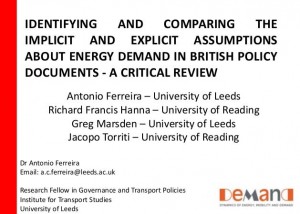 Presentation given at RGS-IBG Annual International Conference, London, 27-29 August 2014
Presentation given at RGS-IBG Annual International Conference, London, 27-29 August 2014
Abstract: For policies to effectively move across the research-practice interface the literature suggests that there needs to be a common language and problem framing and a trust in the information that is received. These issues are further compounded in cross-sectorial policy making where, it is suggested, there is greater room for inconsistency and intellectual misalignment.
This presentation will describe on-going work in the DEMAND Centre which is exploring the framing of energy use in policy across the energy and transport sectors. The Centre is concerned with developing a common understanding of the demand for energy, what its causes are, and how it might change and be changed using a lens informed by social theories of practice.
Our analysis will focus on a sample of 20 documents from the energy and mobility sectors drawing on different UK administrations at a national scale and relevant local policies, in addressing the following overall research question: To what extent do policies consider how the timing and flexibility of social practices (i.e. what people do) influence energy consumption, whether people are at home, travelling around, at work or at leisure?
This is broken down into three themes, incorporating six specific sub-research questions:
1) Constituting demand a) What current practices are being taken for granted into the future? b) What kind of data is considered to be able to predict future demand? c) What types of practices are considered to be fixed/immutable or flexible/changeable?
2) Dynamics of demand a) What time scales are being discussed when predicting/analysing/planning for future demand? b) Where is consumption supposed to take place and what geographical boundaries are being considered in discussions about demand?
3) Steering of demand a) What agents and agency structures are considered to have impacts on demand?
Through this comparative analysis we will shed insights on the types of knowledge that are currently allowed to permeate the research-policy interface, the extent to which they vary across sectors, and whether we have a policy landscape alive to the different spatial and temporal distributions of energy consumption. For example, do understandings of the timing and flexibility of energy demand influence analyses of policy alternatives in government impact assessments? These understandings are fundamental to the effective movement of policy across the transport-energy interface.
*University of Leeds, **University of Reading

